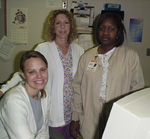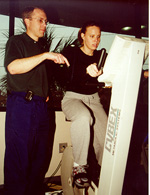Nurse will bike across state for patients
by Cindy AbolePublic Relations
It is Jamie Boehl's job to care for patients arriving for the three-day heart transplant evaluation in MUSC's Congestive Heart Failure and Heart Transplant Clinic. Part of that care includes helping patients get to their scheduled bone density test, X-rays and lab work or rearranging the time for patients to visit the CHF and Heart Transplant program's own nutritionist, coordinator, pharmacist, physicians, and social worker.
 CHF
nurses Jamie Boehl, Linda Chavis and Vicki Lennen have teamed up to create
the “Journey for Life” program to support patients. Not pictured is team
member Irene Smith.
CHF
nurses Jamie Boehl, Linda Chavis and Vicki Lennen have teamed up to create
the “Journey for Life” program to support patients. Not pictured is team
member Irene Smith.
It is also her personal desire to help these post-heart transplant patients who may be struggling financially.
Just as Boehl's patients are tested to their limits,
so will she be as she prepares to peddle across hot, paved Lowcountry
roads towards the hilly midlands of Columbia and north to the Piedmont
of upstate South Carolina this June.
Boehl has committed herself to a five-day, 400 mile bike ride around South Carolina to help raise money and promote awareness on behalf of the state's congestive heart failure patients who are awaiting heart transplants. It is her own “Journey for Life.”
“These patients have to pay a huge amount of money to try to live a better quality of life,” said Boehl, who transferred from home health to clinical nursing about a year ago. “Who has that kind of money? I don't and I work full-time. I'm hoping that these small efforts will help provide post transplant patients with a chance at life, without the struggle and worry about finances.”
The idea for the Journey of Life bike ride was borne after Boehl and her clinical co-workers—Linda Chavis, Vicki Lennen and Irene Smith—agreed to help out. Today, the team is busy planning fundraising efforts for Boehl through staff, faculty and community benefits, donations, raffles, bake sales, etc.
“We realized we can help patients and having Jamie and members of our staff involved seems to personalize it,” said Linda Chavis, a nurse with the clinic. “We've realized that like Jamie, our road to success is very hard, but we know we wanted to be involved.”
Congestive heart failure is a chronic disease that affects about 5 million Americans, with 400,000 newly diagnosed cases per year.
It occurs when the heart can't pump enough oxygen-rich blood throughout the body to other organs. CHF can be caused by multiple factors; including coronary artery disease and high blood pressure. But unlike other chronic diseases, its progress can be slowed through patient awareness and changes in lifestyle, diet, proper medications, exercise, and early recognition of symptoms.
The cost of a transplant is extremely expensive. About $24,000 per year or $2,000 per month is dedicated strictly for medications that are critical to the transplant patient's successful recovery and continued good health.
While a portion of the cost of some medications are paid for by private insurance, Medicare, and Medicaid, other medications may not be covered at all. Despite the most comprehensive insurance plan, the patient is still left with a significant financial burden for post-transplant medications.
To be listed for transplant, a candidate must have sufficient insurance and personal funds to cover surgery, post-operative expenses for rehabilitation and housing (if the patient is not from the Charleston area) and the first year of medications. If the candidate does not have sufficient insurance and personal funds, he will be required to obtain funds for these expenses before being listed for transplant.
“Although most congestive heart patients don't need a transplant and can be medically managed, we can identify patients who are asymptomatic and who have advanced heart failure that can lead to sudden death,” said Naveen Pereira, M.D., assistant professor of transplant medicine, Division of Cardiology. “The key is to identify CHF patients early so they can be treated with conventional therapy.”
“Our goal in transplant is to help people get well so that they can return to work and continue to lead productive lives," said Carol Jaskunas, MSW, LISW, cardiac transplant social worker. Jaskunas meets with transplant patients and their families offering support and directions as patients are assessed for transplant. During the evaluation, she talks with patients and conducts a psycho-social evaluation focusing on patient compliance and financial and social support. Next, she submits her findings to the CHF and Heart Transplant team.
Later, Jaskunas meets with these patients again to reassess their needs.
“At this point, patients are usually happy that they are alive, but at the same time they are worried about their future costs after insurance and Medicare funds are exhausted,” Jaskunas said.
For now, the answer for financially challenged patients lies in the form of fund-raisers. Jaskunas often provides patients with a list of professional groups that organize fund-raisers. Most programs encourage patients to work with their family, church and other community contacts for organization and support.
“The biggest challenge for patients is conducting fund-raisers during that first year of diagnosis,” Jaskunas said. “But it is hard, especially if you're an older patient. You tend to be weaker and need help to manage all of the organizing.”
Boehl is no stranger to fundraising. She previously biked in the Diabetes Foundation's Fast Take bike ride across South Carolina completing more than 150 miles from Orangeburg to Folly Beach in just two days. She was inspired recently when she saw cyclists with the Five Points of Life Ride 2000, ride through MUSC's campus and through Charleston. That 42-day Maine to Florida ride was organized to raise awareness for life-saving organ and tissue donations throughout the country.
As the state's only cardiac transplant program, the CHF and Heart Transplant Program has provided patients with a multidisciplinary team approach to care. Patients benefit from the skills of physicians, nurses, nurse practitioners, transplant nurse coordinators, dietician, pharmacist, social worker and financial coordinator when dealing with all aspects of this disease. Within the last few years, newer medications and drugs have added to standard therapy. The team is also an active participant in multiple clinical trials and hopes to expand its patient care around the state through the development of outreach clinics.
“Jamie Boehl's efforts go a long way to bring the issue of CHF to the front of public awareness,” said Adrian Van Bakel, M.D., medical director and transplant cardiologist of MUSC's Heart Transplant Program.
For information about “Journey for Life” contact Boehl at boehlj@musc.edu.
Training is a team effort
by Cindy AbolePublic Relations
When Jamie Boehl's not peddling in a fury on her Schwinn recumbent stationary bike at home, she's cycling at the Harper Student Center under the training and guidance of fitness program coordinator Jim Tomsic.
“My goal is to help assure Jamie's success, so that she's comfortable physically throughout the event,” Tomsic said. “For Jamie, this event offers the best type of physical challenge,” Tomsic said. “It's a good challenge for me, as well.”
 Jim
Tomsic monitors cyclist Jamie Boehl as she trains for her 400-mile bike
ride across the state this June. Boehl's efforts will help raise money
and awareness of congestive heart disease across the state.
Jim
Tomsic monitors cyclist Jamie Boehl as she trains for her 400-mile bike
ride across the state this June. Boehl's efforts will help raise money
and awareness of congestive heart disease across the state.
Tomsic, himself a cyclist, is training simultaneously for a downhill 24-mile mountain bike race in Snowshoe, W.Va., in mid-June.
Cycling offers a lower body workout exercising the hamstrings, glutes, quadriceps, calves, abdomen and lower back providing good cardiovascular benefits.
A non-weight bearing form of exercise, cycling can provide maximum benefits with the smallest risk for injury, according to Tomsic. It's especially helpful for recovering rehabilitation patients.
But despite all of her physical efforts, what's tougher: the mental or physical part of training?
“It's more mental,” Tomsic said. “When you're out there on the road and you're logging in many miles per day, your body will know it. It will depends on how a person reacts to their body, its adjustment to outside obstacles like terrain, interaction with traffic, etc.”
Boehl's beginning workout involves training six days-a-week ranging from 30 to 90 minutes. For now, she's concentrating on increasing her cadence (stride) and stamina to develop a sharp mental edge. She and Tomsic are training under the Lance Armstrong Performance Program, a program devised by 1999 and 2000 Tour de France cycling winner Lance Armstrong and his coach Chris Carmichael. The seven-week training program offers a training regimen to strengthen the cardiovascular system during a high performance event. Although Boehl's event is non-competitive, she can still benefit from power interval training—the equivalent to sprinting and increased endurance.
“Doing this is an important time commitment,” said Tomsic, speaking of Boehl. “It's important that she sets aside time for training. It will take months of preparation to accomplish this feat.”
As her training level increases Boehl will shift to more outside riding. Tomsic has encouraged her to participate in weekly bike rides sponsored by the Coastal Cyclists, an organized group of Lowcountry cyclists.
“She'll learn so much from riding with a group,” Tomsic said. “She'll
learn about proper conduct for a biker in traffic and other good riding
tips. More importantly, she'll gain the comradery that a good support group
usually offers.”